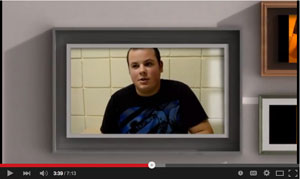Do You Have Low Selfie-Esteem? Guess What Might Be To Blame
Study Suggests Facebook is Responsible for Girls Body Image Problems
By Ora TV
Teens who allocate a majority of their time online to Facebook photos are more likely to develop eating disorders. Seeing countless images of certain body shapes leaves girls dissatisfied with their own appearance. This is turn can lead to severely low self-esteem and eventually, eating disorders.
Amy Morin, LCSW, a regular contributor to Forbes Magazine, put it this way in her article entitled "What Your Facebook Use Reveals About Your Personality And Your Self-Esteem."
In this technological age, social media has become a primary gateway to connect with friends and the world around us as part of our daily ritual. Yet what often begins as a harmless virtual habit for some can fast-track into a damaging, narcissism-fueled addiction which impacts negatively upon our self-worth and the way we perceive others.
Studies show that up to two-thirds of people find it hard to relax or sleep after spending time on social networks. Of 298 users, 50 percent said social media made their lives and their self-esteem worse. So just what exactly is it about social media that allows it to affect our self-worth?
According to psychotherapist Sherrie Campbell, social media can give us a false sense of belonging and connecting that is not built on real-life exchanges. This makes it increasingly easy to lose oneself to cyberspace connections and give them more weight than they deserve.
"When we look to social media, we end up comparing ourselves to what we see which can lower our self-esteem. On social media, everyone’s life looks perfect but you’re only seeing a snapshot of reality. We can be whoever we want to be in social media and if we take what we see literally then it’s possible that we can feel we are falling short in life," Campbell says.
How do you tell if your social network habit is healthy or harmful? If you find yourself feeling stressed, anxious or having negative thoughts after using social media, it may be time for a break. Here are seven telltale signs social media could be negatively impacting your self-esteem…and what you can do about it.
-
Social media disrupts your real-world thoughts and interactions.
If you feel worried or uncomfortable when you’re unable to access social media or your emails, it is likely your social media dependency is compromising your self-esteem.
-
Social media affects your mood.
If this voyeuristic habit is affecting your thoughts and feelings about yourself, it is likely harmful to your self-esteem.
-
Real-life interactions are difficult and being alone is uncomfortable.
If you’re struggling with face-to-face connections or find it difficult to communicate, social media may be to blame. Studies have shown social media is a pathway to shallow relationships and emotionally detached communication.
-
You find yourself envious about what others are promoting.
When we are depressed or down or just feel bad in general, it is easy to become jealous or envious of what other people are advertising about their life, particularly images of alleged happiness or success. It is important to remember that what you are viewing is only a small sliver of someone’s life. When such images are starting to poison the way you look at your own life it may be time to step away from the screen.
-
You relish in others’ misfortune.
If you find yourself happy when other people are unhappy on social media, it may be time to ask yourself whether social media is a healthy psychological choice for you. You may merely be validating your own misery and unhappiness by comparing yourself to others. But even those advertising their tragedies on social media are doing so because they crave attention, whether positive or negative, in a bid to boost their low self-esteem.
-
You measure your success by others.
Reality check: the number of contacts or likes a person may receive on social media doesn’t equate with life success. Sure, social media allows us to assume everyone else is feeling and living a better life than we are but what are we really seeing here? It isn’t a person’s whole life, not even a reflection of reality, but merely a glimpse of the life they choose to present through rose-colored lenses. It’s more productive to make real-world changes that will help you feel more successful and secure in your life than to spend time building your social media online persona.
-
You’re addicted to the attention and drama.
It’s easy to get sucked into the drama and juicy gossip encapsulated by social media especially when your own real life is lacking any sort of excitement or fulfillment. But this can be a dangerous game to play and often people get hurt. Studies have shown that Facebook contributes to jealousy in relationships and excessive use can in fact damage relationships by virtue of the fact that information a person would not normally share becomes public knowledge.
Need a Solution?
For those who think their self-esteem is being influenced negatively by social media, the most important thing to do is reconnect with your presence and your personal brand—that means unhooking from computer land. If you realize why you’re turning to technology in times when connection or learning new information isn’t critical, you’ve made the first step to reconnecting with yourself.
Editor's Note: Ora TV's NewsBreaker Team delivers breaking news, today's trends, and what's buzzing in the Twitter-verse and social media. The Selfie Esteem Issues? video and related content is reposted with permission.
The Forbes article, What Your Facebook Use Reveals About Your Personality And Your Self-Esteem, was reprinted in its entirety with permission by author Amy Morin, who is a licensed clinical social worker and psychotherapist who counsels children, teens, and adults. In addition to serving as an adjunct psychology instructor, Ms. Morin serves as About.com’s Parenting Teens Expert and Child Discipline Expert. She is a Forbes contributor where her weekly column focuses on the psychological aspects of business. She’s also writes for Psychology Today. She also authored "13 Things Mentally Strong People Don’t Do," a must read!









 Leave a comment
Leave a comment